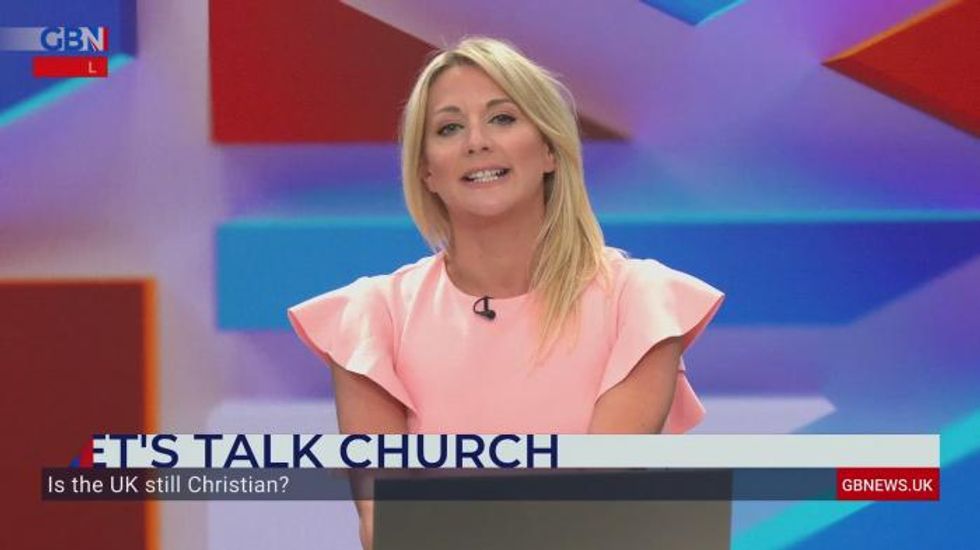Don't Miss
Most Read
Trending on GB News
Politics and religion, never to be brought up in polite company To ask someone their beliefs, secular or theological, was for a long time cultural taboo. Yet today has seen an explosion in political identity. Remainer. Leaver. Socialist, Conservative, Marxist, Libertarian, Communist. The centre ground ceded to a rebirth of political polarity.
Yet what about religion? While imported religions are emboldened in our multi faith society to proudly wear the tags of identity, the religion of this country sits meekly in the corner, oftentimes derided, denied and discarded.
The official religion of the United Kingdom is Protestant Christianity. The Church of England our state church and the Monarch the Supreme Governor. Our Queen was anointed defender of the faith by the Archbishop of Canterbury during her coronation in Westminster Abbey almost 70 years ago. Yet as Head of the Commonwealth and Sovereign of Modern Britain, she has very much styled herself as defender of ALL faiths.
Christianity in Britain is not something that screams about its existence, but is intrinsically woven into the fabric of our society. Or perhaps the fabric of our society is woven into it. To grow up British is in many respects to grow up culturally Christian, even though doctrinal Christianity is under assault. Christianity is like many particles of air, breathed in but totally imperceptible. The values by which we expect others to live find their genesis in the Bible.
Historian Tom Holland compared the Ancients’ brutality and savagery to society today. The uncompromising supremacy and hierarchy of might banished to the realms of our cruel and inhumane ancestors. Unthinkable in today’s world of welfare, that fights exploitation, advocates universal rights and promotes what have become accepted moral virtues. How did we get from there to here? In short, Christianity utterly transformed the world.
For many of us, our interaction with Christinaity is at once inherent, yet invisible, our occasional practice exhibited perhaps perversely as consumers for what have become primarily commercialised festivals. Congregations have collapsed, while censuses betray a sharp decline in religious engagement. Yet how many of us, when facing tragedy, turn in desperation to prayer, despite not being able to identify what we believe? God on speed dial during an emergency.
Faith is an inevitable and intractable part of the Human Condition. And so the pandemic did something quite remarkable. Despite Churches shutting physical doors, online congregations swelled. Forced to embrace new forms of engagement as people feared for their lives and for their loved ones, God became pastor and pedagogue on Zoom.
The direction of travel until recently had been quite the opposite. At the start of the 20th century two thirds of the world’s Christians lived in Europe. At the start of this century, it’s just a quarter. Here in the UK, for the first time in history, the number of Britons describing themselves as Christian has dropped below 50%. Even 20 years ago that figure was 72%. Today, the vast majority identify as having no religion at all.
What does this mean for the Church? Do we now live in a post-Christian era? Through expunging and uprooting the basic tenets of Judaeo-Christian values, what takes their place? New secular religions clash and compete, social justice campaigners fighting for the prioritisation of their set of rights. Increasingly under attack is the pursuit of moral consensus. The idea that one set of rules, freed from the frailty of the human condition and sacrosanct via provenance in a higher power, governs us all? What happens when the Christian focus on collectivism is judged by today’s precedence of individualism?
Yet as Christianity appears forced into decline, more and more are yearning for what it provides. Statistics reinforce that children brought up in the Christian faith are less likely to take drugs, get divorced or get into trouble with the law. There is massive competition to get into church schools. We want the trappings of Christianity, yet our fidelity is flippant and our faith shaken by the agnosticism of the post-industrial age.
Christian views on sexuality and the family that shaped functional civilization for two millennia are increasingly attacked in the public square, at odds with the modern cult of ultra liberalism. If you want to get on in politics or business, you are advised not to publicly pledge allegiance to old fashioned Christian values. A poignant and tragic twist in the tale of Christian Britain.
It poses the question of who is there to defend Christianity? A country that is urged to protect other faiths, scared to protect its own. Perhaps the most strident example is the Gay Marriage Act, an unprecedented Parliamentary diktat on Holy doctrine with the demand that a religion recalibrate in line with secular modernity. Parliament did not dare to demand similar rights be enforced in Mosques, Temples and Synagogues. Religious freedom is a privilege, unless it is Christian.
Christianity has become the punchbag of a confused society. The Church increasingly shies away from civic governance leaving a vacuum that activists have hungrily seized. How do ethical imperatives play out in an individualist age? The answer is not well.
Yet perhaps this sense of oblivion is now driving elements of the Church forward? Contemporary Evangelism is thriving. A network of ‘oh you are also exploring God’ is growing beneath the surface, especially among younger generations, palpably aware that something is missing.
The German Philosopher Freidrich Nietszche famously proclaimed God Is Dead. But any Christian will tell you, he has an uncanny way of resurrecting. Today, we really need to talk about The Church.











